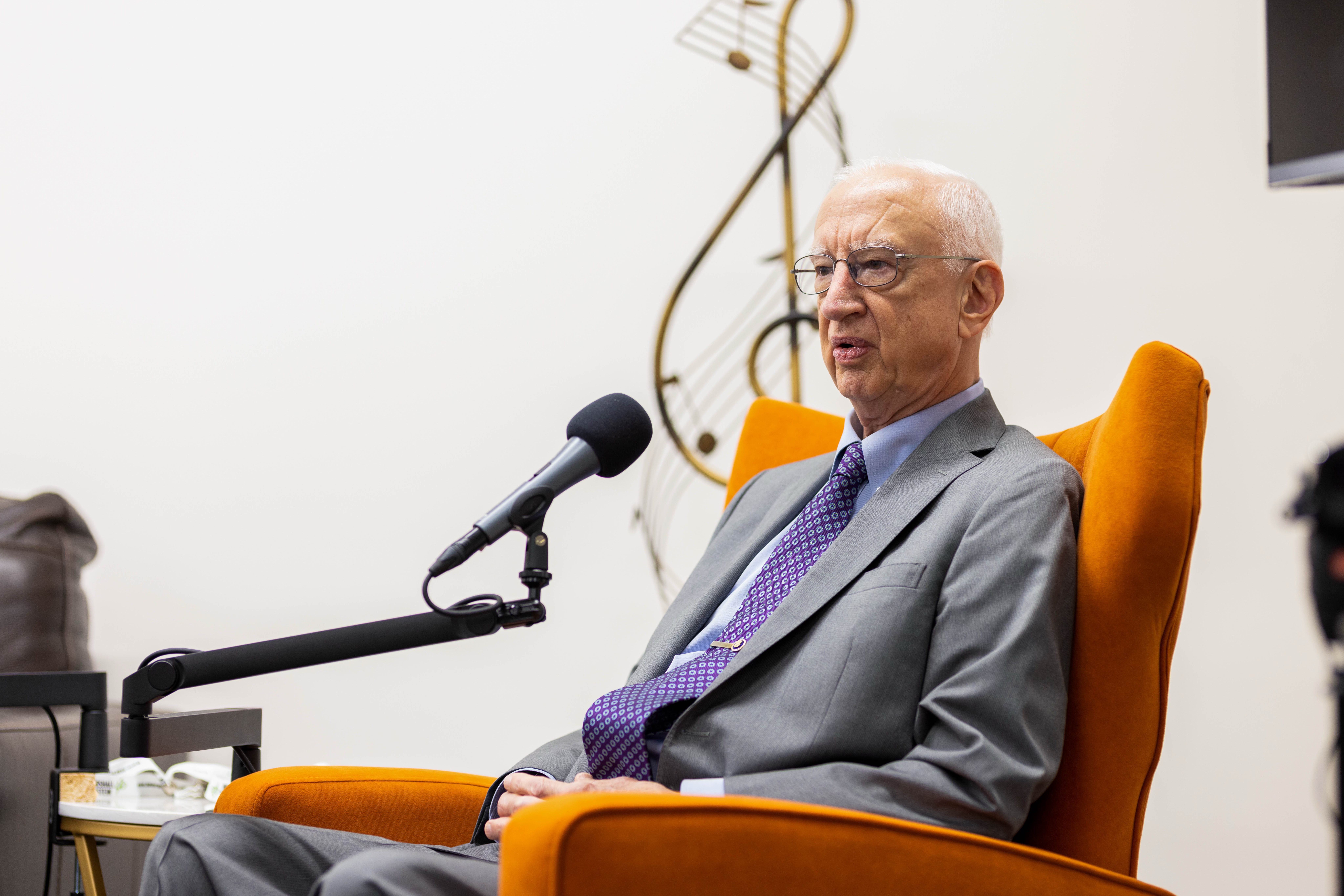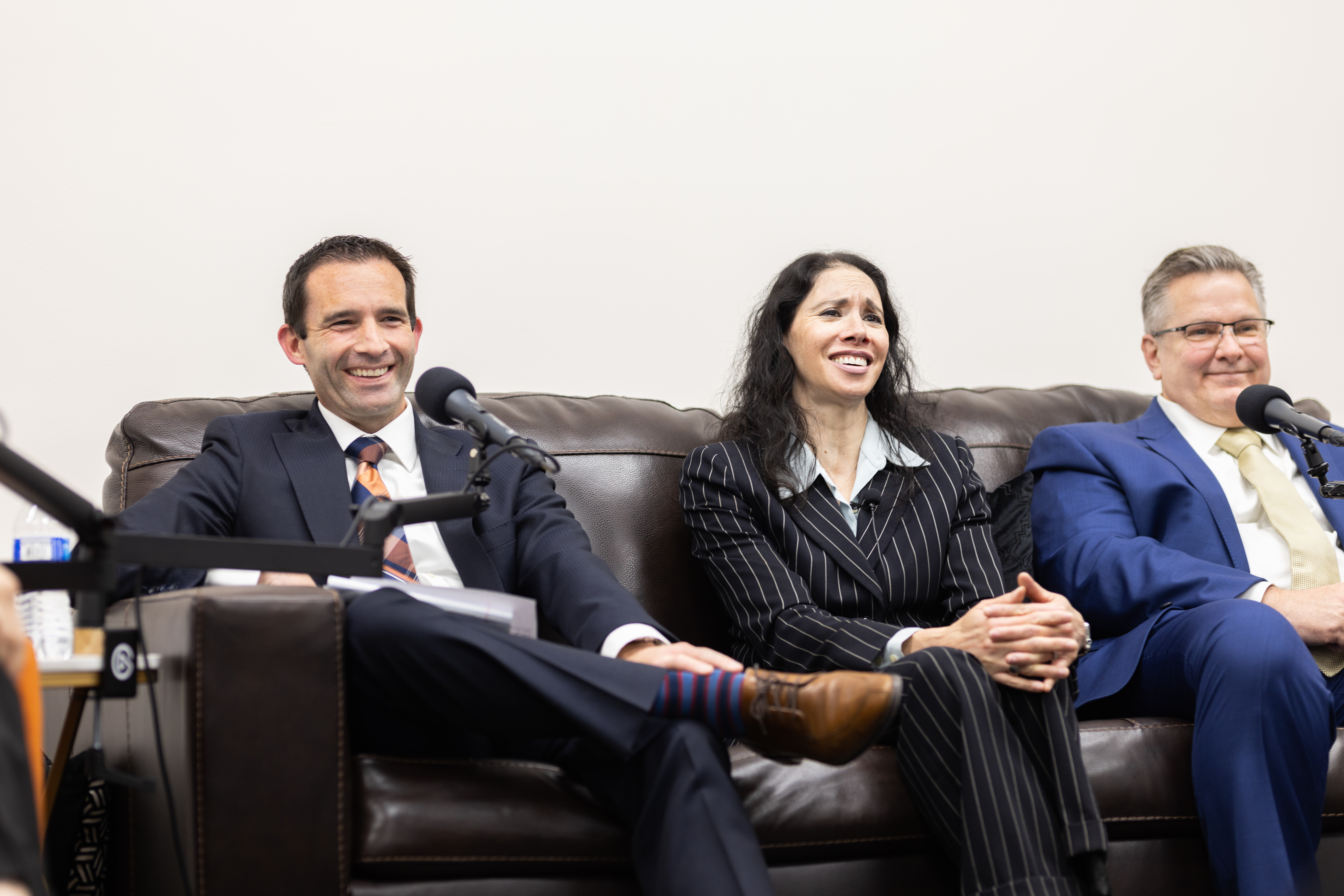“I think when the bills are introduced and get cosponsored by numerous people of both parties, and then they start holding hearings, that will create a huge amount of momentum, and when the courts see the momentum, they will start acting on their own – particularly the Federal Circuit.” – Judge Paul Michel

Judge Paul Michel speaking at IPWatchdog’s Patent Litigation Masters conference on Monday, May 15. Photo by Jessica Brown Photography.
On day one of IPWatchdog’s Patent Litigation Masters program yesterday, the U.S. Supreme Court denied two patent eligibility cases that the U.S. Solicitor General had recommended granting. The denials make it fairly clear that the High Court is not interested in helping to resolve the current problems with U.S. patent eligibility law, which generally have to do with a lack of clarity, arguably fostered by many of the Court’s own precedents.
Following the last panel of the day on Monday, in which speakers discussed ways to improve and streamline patent enforcement in America, retired U.S. Court of Appeals for the Federal Circuit Chief Judge Paul Michel told IPWatchdog he thinks the Supreme Court’s refusal to take up patent eligibility is self-serving. “I think the Court doesn’t want to admit they messed up the law in the four decisions – Bilski, Myriad, Mayo and Alice. They don’t even admit that it’s a big problem, but it is a huge problem, and everybody in the patent world knows it’s a huge problem,” Michel said.

From left: Matt Rizzolo, Wendy Verlander and Todd Walters. Photo by Jessica Brown Photography.
Both on the panel and in his comments to IPWatchdog, Michel said that Congress is the only hope, and it may not be a lost cause this time. “It needs fixing urgently, so Congress has to step up and do it, and I think that’s actually going to happen quite soon.” In addition to a bill tackling eligibility law, Senators Thom Tillis (R-NC) and Chris Coons (D-DE) will also be introducing legislation to fix the problems with the Patent Trial and Appeal Board (PTAB) and the issue of scarce injunctions for patent infringement, he said.
While quick passage is unlikely, Michel said the mere introduction of legislation could build momentum. He explained: “The three biggest problems are all about to be the subject of bipartisan bills in the Senate, and the House will follow suit. I think when the bills are introduced and get cosponsored by numerous people of both parties, and then they start holding hearings, that will create a huge amount of momentum, and when the courts see the momentum, they will start acting on their own – particularly the Federal Circuit.”
In the meantime, however, many lamented the Court’s choice yesterday not to deal with the eligibility issue now. Below are some comments from IP stakeholders, including Michel, on what the denials mean for the U.S. patent system, and eligibility law going forward.
Jeremy Anapol , Knobbe Martens
, Knobbe Martens
“The Supreme Court’s decisions denying certiorari in these two cases continue the trend of turning away cases that ask the Court to clarify the Section 101 analysis but provide no concrete proposal for how to do so. The questions presented in these cases show that the petitioners did not give the Supreme Court the tools it would need to bring more clarity to this area of the law.
The question presented in Tropp was focused on whether the specific patent claims at issue in that case were patent eligible. This is not the type of recurring legal question that the Court often looks for, and not the type of question whose answer is likely to add much clarity to the broader body of law. At the opposite extreme, the questions presented in Interactive Wearables were so broad that they would apply to essentially every Section 101 case. For example, the first question in the Interactive Wearables petition asked, “What is the appropriate standard…?” This question does not invite any specific, straightforward answer that could plausibly provide the clarity that lower courts and litigants have been seeking.
The Supreme Court may be more willing to answer the call for clarity in the Section 101 analysis if a future petitioner manages to present a question that shows the justices a clear path forward.”
Dina Blikshteyn , Haynes Boone
, Haynes Boone
“The Supreme Court’s decision not to hear Tropp and Interactive Wearables means the courts will proceed as before: decide patent eligibility on a case-by-case basis, using a highly subjective patent eligibility test that lacks uniformity and certainty. Although the decision not to hear Tropp was expected, the decision not to hear Interactive Wearables was surprising. Unlike Tropp, the claims in Interactive Wearables appeared to be directed to an improved wearable content – a technological improvement. Using Interactive Wearables as a guide, I do not expect the Court’s decision on hearing Avery Dennison v. ADASA to be any different.
Patent eligibility is further complicated because the USPTO and the courts do not even apply the same patent eligibility test. The USPTO splits Step 2A into Prong One (whether the claims recite a judicial exception) and Prong Two (whether the judicial exception is tied to a practical application). The courts, however, are not required to perform the analysis in Prong Two. This means that patents that have recently overcome the patent eligibility hurdle and were issued by the USPTO may still be found to be patent ineligible by the courts, causing even more frustration for patent owners and practitioners alike. Perhaps it’s best to look to Congress for guidance on what is patent eligible and what is not.”
Hon. Paul R. Michel , Chief Judge (ret.) U.S. Court of Appeals for the Federal Circuit
, Chief Judge (ret.) U.S. Court of Appeals for the Federal Circuit
“It’s been clear for a long time, and the recent denials make it still clearer than before, that the Supreme Court has no interest in fixing the eligibility problem. The eligibility problem, in my view, is the single biggest problem in the entire patent system because it’s created chaos, total unpredictability, inconsistent results, and has caused many patents to be wrongly invalidated. So, it’s obvious the Supreme Court won’t fix it, and therefore the Congress has to fix it. Fortunately, Senators Tillis and Coons have framed an extremely good eligibility reform bill. It’s imminently going to be introduced in the Congress, it’s bipartisan, supported by liberals and conservatives, “R”s and “D”s, and it has a lot of merits. It’s been very carefully worked out. I’ve seen the near final draft and I personally think it’s an extremely good, realistic fix for this overwhelming problem.”
Will Milliken , Sterne Kessler
, Sterne Kessler
“That the Supreme Court has now asked for the government’s views in five separate § 101 cases in recent years suggests that the Justices are interested in addressing subject-matter eligibility. That they have rejected multiple grant recommendations from the government, however, suggests that the Justices have not yet found a case they view as a suitable vehicle for doing so. Avery Dennison differs from the other cases that the government has recommended the Court take in that the petitioner in Avery Dennison is arguing that the Federal Circuit is applying § 101 too narrowly, instead of too broadly. If the Justices are inclined to that viewpoint—as opposed to the more patentee-friendly viewpoint set forth in the other recent high-profile § 101 petitions—then perhaps Avery Dennison has a chance at a grant. We will know more after the Court’s May 25 conference, when it is set to consider the petition.”
Wendy Verlander , Verlander LLP
, Verlander LLP
“I think it doesn’t bode well for any future Supreme Court accepting cert for patent eligibility. They’ve denied it so many times that now I’m just hoping Congress does something. I’m heartened by what Judge Michel said [about soon-to-be-introduced legislation on eligibility]. Normally I wouldn’t hold out much hope for a Congressional solution, but after what Judge Michel said, I do feel more encouraged.”

![[IPWatchdog Logo]](https://ipwatchdog.com/wp-content/themes/IPWatchdog%20-%202023/assets/images/temp/logo-small@2x.png)

![[Advertisement]](https://ipwatchdog.com/wp-content/uploads/2024/04/Artificial-Intelligence-2024-REPLAY-sidebar-700x500-corrected.jpg)
![[Advertisement]](https://ipwatchdog.com/wp-content/uploads/2024/04/UnitedLex-May-2-2024-sidebar-700x500-1.jpg)
![[Advertisement]](https://ipwatchdog.com/wp-content/uploads/2024/04/Patent-Litigation-Masters-2024-sidebar-700x500-1.jpg)

![[Advertisement]](https://ipwatchdog.com/wp-content/uploads/2021/12/WEBINAR-336-x-280-px.png)
![[Advertisement]](https://ipwatchdog.com/wp-content/uploads/2021/12/2021-Patent-Practice-on-Demand-recorded-Feb-2021-336-x-280.jpg)
![[Advertisement]](https://ipwatchdog.com/wp-content/uploads/2021/12/Ad-4-The-Invent-Patent-System™.png)






Join the Discussion
32 comments so far.
small inventor
May 20, 2023 07:48 pmWhat would happen to the guy from the movie “Flash of genius” today ?
In today’s America you gotta be absolutely crazy self-destructive lunatic to patent anything new and useful
Patent lawers can talk all they want for their entertainment here but this is a done deal – carefully planned and generously financed 20 years ago in SV, faithfully executed in wash dc by both political parties, potuses, congresses, scotuses, cafcs etc. etc. and sealed
Directive 10-289
RIP merican patent system
Anon
May 19, 2023 11:35 amCurious,
These are not mere feelings. That you would indicate so is yet another failure on your part.
You have NO facts — and to intimate otherwise based on post 1952 writings (which you have NOT presented) changes nothing. You ask me to cite something that YOU have only (now) handwaved. Respectfully, you first.
Your notion of MISstating my position is – to be blunt – CRAP. Again, you have not provided any basis for your view (your ‘facts’ are not facts), AND you have ignored the plain history and natural order of time. My “views” are not merely ‘my philosophy,’ as they are a direct reflection on history. YOU are welcome to your opinion, You are not welcome to deny history.
My sentence on the logical outcome of your bending of history IS intelligible. Do not mistake your lack of intelligence as an attribute of my writing.
Your nonsense on “omission” by me is plainly false. But I suppose that you feel a need to keep digging as opposed to simply admitting your own baseline mistake in the assertion that somehow the Supreme Court Justices were attacking a patent law item that had yet to have been written into patent law.
Time travel is so much more convenient for you than admit a mistake, isn’t it?
Curious
May 19, 2023 11:09 amSimply put, “obviousness” was NOT an element of patent law prior to its actual creation and implementation into patent law.
Your feelings on the matter are noted.
NO amount of “ex post” hand waving CAN change the simple facts of history
Frederico and the Supreme Court in Graham v. Deere said otherwise. Call it “hand waving” if you want, but my facts are better than your ZERO facts. If you are going to invoke “the simple facts of history,” you should do us all a favor and cite to them.
You are of course free to ‘believe’ anything you choose to believe [facts be damned]
Your philosophy in a nutshell.
Your reasoning thus is shown to be quite literally anything could thus be attributed to the time before the actual law was changed and an item — not present before was added to the law.
Next time try to write that sentence like a good attorney – you know – like something intelligible.
From long observation, I have noticed that you omit from your writings 25-75% of what you are probably thinking. You write fragments of arguments – not whole arguments. Consequently, oftentimes it becomes very difficult understanding what point you are trying to make and/or what is the support for your point. You seem to write for you – not your reader.
Anon
May 19, 2023 08:15 amCurious,
You remain flawed and NO amount of “ex post” hand waving CAN change the simple facts of history.
Simply put, “obviousness” was NOT an element of patent law prior to its actual creation and implementation into patent law.
Congress could have chosen differently in 1952, but they did not.
Had they done so, no doubt your twisted attempt to rewrite history would be clamoring for that different path to have been the object of the pre-1952 Supreme Court.
Your reasoning thus is shown to be quite literally anything could thus be attributed to the time before the actual law was changed and an item — not present before was added to the law.
You are of course free to ‘believe’ anything you choose to believe, no matter how logically impossible that belief may be.
Model 101
May 18, 2023 09:57 pmTalk. Talk. Talk.
The courts have made a mountain out of a molehill to steal from the inventors.
Curious
May 18, 2023 08:44 pmEasy. Obviousness as that legal concept is to be understood was introduced in the Act of 1952.
No. While the term “obvious” may have been introduced in the 1952 Patent Act, as the language of Cuno Engineering Corp. implies, determining whether those would combine references were a factor in determine whether or not to grant a patent.
As another example, in A. & P. Tea Co. v. Supermarket Corp., 340 U.S. 147 (1950), the Supreme Court held that “[t]he mere combination of a number of old parts or elements which, in combination, perform or produce no new or different function or operation than that theretofore performed or produced by them, is not patentable invention.” This is an obviousness analysis.
Perhaps the best source is the Frederico commentary, which refers to the Committee Report as stating:
Section 103, for the first time in our statute, provides a condition which exists in the law and has existed for more than 100 years, but only by reason of decisions of the courts. An invention which has been made, and which is new in the sense that the same thing has not been made before, may still not be patentable if the difference between the new thing and what was known before is not considered sufficiently great to warrant a patent. That has been expressed in a large variety of ways in decisions of the courts and in writing. Section 103 states this requirement in the title. It refers to the difference between the subject matter sought to be patented and the prior art, meaning what was known before as described in section 102. If this difference is such that the subject matter as a whole would have been obvious at the time to a person skilled in the art, then the subject matter cannot be patented.
Notice the part when talking about 103 that they refer to “a condition which exists in the law and has existed for more than 100 years.” Clearly, Congress changed the standard, but the standard they changed is what we now refer to as obviousness.
Your attempt to read “obviousness” prior to 1952 is flawed.
Your feelings on the matter are noted. However, your feelings are not consistent with the commentary. Again, in the discussion regarding 103, the following is found in the commentary:
Despite the fact that the requirement had been part of the law for at least nearly a century, the patentee in The Cuno Engineering Corp. v. The Automatic Devices Corp., 62 S-Ct. 37,314 U.S. 84, 86 L.Ed. 58 (1941), urged before the Supreme Court that it was unwarranted. This explains the concluding paragraph of the decision, “Such considerations prevent any relaxation of the rule of the Hotchkiss case as respondent would seem to desire.” The Court’s conclusion in first stated “It is our opinion that the Mead device was not the result on invention but a ‘mere exercise of the skill of the calling,’ an advance ‘plainly indicated by the prior art’ “
Again, they are referencing old patent decisions that describe, in so many words, they same concepts that are today used to determine whether something is obvious.
And this is from Graham v. John Deere:
It is undisputed that this section was, for the first time, a statutory expression of an additional requirement for patentability, originally expressed in Hotchkiss. It also seems apparent that Congress intended by the last sentence of § 103 to abolish the test it believed this Court announced in the controversial phrase “flash of creative genius,” used in Cuno Engineering Corp. v. Automatic Devices Corp., 314 U. S. 84 (1941). [Footnote 7]
which is followed by:
We believe that this legislative history, as well as other sources, [Footnote 9] show that the revision was not intended by Congress to change the general level of patentable invention. We conclude that the section was intended merely as a codification of judicial precedents embracing the Hotchkiss condition, with congressional directions that inquiries into the obviousness of the subject matter sought to be patented are a prerequisite to patentability.
By referring to “codification of judicial precedents,” the Supreme Court indicates that they believe this legal concept was NOT first introduced in the Patent Action of 1952. Rather, the Supreme Court believes this was first introduced in Hotchkis, which was from 1851.
Sorry.
Anon
May 18, 2023 05:19 pmAlso keep in mind that the drafters of the Act of 1952 debated about “obviousness” versus other possible paths, including a possible inclusion of the definition for “invention.”
Your attempt to read “obviousness” prior to 1952 is flawed.
Anon
May 18, 2023 05:10 pmYou ask, “ How can 103 address the “Flash of Genius” test but the “Flash of Genius” test is not about obviousness?”
And the answer is:
Easy. Obviousness as that legal concept is to be understood was introduced in the Act of 1952.
It simply was not there prior.
Whatever the Supreme Court was doing with its “heightened view of what it means to be inventive” was NOT obviousness.
Curious
May 18, 2023 02:43 pmas obviousness as a legal concept (your “interchangeability”) was ALSO not something that the pre-1952 Supreme Court was addressing with their Flash of Genius.
How can 103 address the “Flash of Genius” test but the “Flash of Genius” test is not about obviousness?
This is from Cuno Engineering Corp. v. Automatic Devices Corp., 314 U.S. 84 (1941):
That is to say, the new device, however useful it may be, must reveal the flash of creative genius, not merely the skill of the calling. If it fails, it has not established its right to a private grant on the public domain.
Tested by that principle, Mead’s device was not patentable. We cannot conclude that his skill in making this contribution reached the level of inventive genius which the Constitution, Art. I, § 8, authorizes Congress to reward. He merely incorporated the well known thermostat into the old “wireless” lighter to produce a more efficient, useful, and convenient article.
Incorporating one teaching into another is about obviousness.
Anon
May 18, 2023 01:59 pmAs I noted, Curious – a minor nit.
Compounded of course by your latest response, as obviousness as a legal concept (your “interchangeability”) was ALSO not something that the pre-1952 Supreme Court was addressing with their Flash of Genius.
Curious
May 18, 2023 11:42 amYou have that decidedly wrong, as the Flash of Genius of the Supreme Court was pre 1952, and 35 USC 103 was the answer from Congress.
More of an error in terminology than “decidedly wrong.” My error was because I oftentimes use 103 and obviousness interchangeably. As you correctly noted, 103 was created in the 1952 Patent Act. However, the point remains the same, which is that the Flash of Genius test was removed by Congress and the Supreme Court has not resurrected it.
jacek
May 17, 2023 11:53 amSenators Thom Tillis (R-NC) and Chris Coons (D-DE) are Foxes guarding hens.
Anonymous
May 17, 2023 11:36 amJudge Michel characterizes “imminent” legislation:
“an extremely good eligibility reform bill”
“it’s bipartisan, supported by liberals and conservatives, “R”s and “D”s, and it has a lot of merits. It’s been very carefully worked out. I’ve seen the near final draft and I personally think it’s an extremely good, realistic fix for this overwhelming problem.”
While I hope good legislation will fix the 101 morass soon, I don’t like lawmaking done in backrooms and out of public view. That we’re being pre-sold on some bill being cooked up in the shadows makes me highly suspicious that its a clean bill aimed only at 101.
I do agree that Congress must fix this mess immediately, abrogating Alice entirely.
Night Writer
May 17, 2023 10:34 amThe Supreme Court may want to sort out the functional claim terms issue first.
That is why I think they denied cert. Probably pick up 101 after they figure out how to deal with the functionality issue, which is, of course, tied closely to Alice with “abstract idea.”
Pro Say
May 17, 2023 10:19 amWhile one hopes Judge Michel is correct about a potential (likely?) new, corrective bill, one has also to be wary that onerous, unnecessary patent requirements could be included.
For example, trading (a) 101 solution(s) for, e.g. new 112 changes / requirements would only open up a new, who-knows-for-how-many-years, court-and-patent-office can o’ worms.
Trading one morass for another morass.
Such changes would most certainly NOT enable the restoration of America’s patent world leadership.
Breeze
May 17, 2023 09:18 am“Go ahead is regale us with you legal acumen by point out an example where Congress explicitly rebuked the Supreme Court on some issue and the Supreme Court didn’t back down.”
Your faith in SCOTUS is misplaced. Which is probably why you still think you’re going to get your patent. (Shrugs)
Anon
May 17, 2023 08:27 amBreeze,
The only one here that is “ponderous” is you.
Your opinion — and it is only an opinion — of a level of a chance of a path being taken only shows how you let your ego get in the way of rational thinking.
Rational thinking would show the legal, structural path as an entirely viable one.
Sure, things would need to change (emotive, cultural drivers) for that path to be taken, but only a f00l thinks that change is not possible.
Heck, we even had a tv personality and megalomaniacal con man BE President.
What would you have put the chances at that?
What’s even “funnier,” is that same person, after being impeached twice is a front-runner and has a path to being elected President again.
Get out of your own way, son.
Minor nit with Curious:
“ Remember the Supreme Court’s “flash of genius” test for 103? If you don’t, it is because Congress did away with it.”
You have that decidedly wrong, as the Flash of Genius of the Supreme Court was pre 1952, and 35 USC 103 was the answer from Congress.
It is thus impossible for the SC’s FoG to have been a test for 103.
small inventor
May 17, 2023 12:07 am“Directive 10-289” and be done with this nonsense called “US Patent System”
This is getting old and ridiculous – the entire world is laughing
May 15th 2006 was when it really started for us – small inventors
(although it was bad enough before)
We were out of business immediately, pretty much next day
17th anniversary we just celebrated
Cheers !
Curious
May 16, 2023 05:31 pmThanks for the chuckle.
Go ahead is regale us with you legal acumen by point out an example where Congress explicitly rebuked the Supreme Court on some issue and the Supreme Court didn’t back down.
Remember the Supreme Court’s “flash of genius” test for 103? If you don’t, it is because Congress did away with it.
Breeze
May 16, 2023 03:57 pm“Do not confuse (and conflate) existence of a path and likelihood of a path being taken.”
If there’s less than a zero percent chance of the “path being taken” then does the “path” even exist?
You are ponderous. Just ponderous.
Anon
May 16, 2023 03:30 pmBreeze,
Do not confuse (and conflate) existence of a path and likelihood of a path being taken.
Breeze
May 16, 2023 03:11 pm“That’s not how it works.”
Thanks for the chuckle.
Curious
May 16, 2023 02:59 pmI am aware of it. And the chances of that occurring are, how can I say it, let’s see, ah yes, less than zero. Less than zero. Let that sink in. Less than zero.
Since less than zero is an impossibility, I think snuggled up really, really close to zero so that both can share body heat is a more accurate description of the chances.
Also, to your point, I think the likelihood of reform by Congress is also low. Consistent with that, I also agree with Anon’s point that there are “certain stakeholders [who] have a vested interest in NOT fixing the patent system.”
There are three ways of fixing this mess:
1) Congressional action
2) Supreme Court action
3) Federal Circuit en banc decisions clarifying patent eligibility
I think if one added up the percentage chance of each of those things happening, the number would still be <10%.
The reason why I personally push for 1) is that I think "Big Tech" while having friends in Congress — also have a lot of enemies. If a patent reform bill was introduced and sold on the basis of being "pro-small-inventor and anti-Big Tech," it might get enough support to make it through. However, with Issa chairing the IP subcommittee in the House, it seems unlikely that such a bill would make it through there.
Curious
May 16, 2023 02:51 pmafter years and years of positioning a case to test that “legislative fix” SCOTUS rules, “Despite the recent changes to section 101, we have long held that there are certain exceptions to patent eligible subject matter…” and then ignores that “legislative fix” entirely.
That’s not how it works.
Congress has the power to tell the Supreme Court to “go f*&^ itself” when it comes to powers enumerated to it by the Constitution, and SCOTUS will get the message. SCOTUS has been given a free reign (remember, they cited “statutory stare decisis” in Bilski) because of the inaction of Congress to address these exceptions.
Congress has the constitutionally-granted power to reign in these exceptions in the manner they see fit. Patent eligibility isn’t the kind of political issue that is going to provoke a separation of powers fight so SCOTUS will acquiesce to Congress.
Breeze
May 16, 2023 02:45 pm“I am certain that you are aware of the Constitutional authority that Congress has for jurisdiction stripping from the Supreme Court…”
I am aware of it. And the chances of that occurring are, how can I say it, let’s see, ah yes, less than zero. Less than zero. Let that sink in. Less than zero.
Anon
May 16, 2023 02:26 pmBreeze,
I think that I “get” your point (given the addiction of the Royal Nine to sticking their fingers into the wax nose of patent law), but there certainly is a legislative fix.
I am certain that you are aware of the Constitutional authority that Congress has for jurisdiction stripping from the Supreme Court an item not within the Supreme Court’s Original Jurisdiction.
(sure, this would be effective only if the lower CAFC – or other new Article III Court were to be constituted to both preserve Marbury and to remove the current taint)
Anon
May 16, 2023 02:21 pmAs long as Congress attempts to “listen” to all stakeholders, reform through the legislative branch is DOA.
Bottom line is that certain stakeholders have a vested interest in NOT fixing the patent system.
Scott Moskowitz
May 16, 2023 02:15 pmActual independent inventors’ voices are simply being ignored and many have simply quit. Not surprising; implementers have “beaten” innovators for over 20 years. Who are the champions of inventors & other creatives? Unfortunately, lobbying continues to be cheaper (& more effective) than inventing.
Breeze
May 16, 2023 02:00 pm“I wholeheartedly disagree…”
Noted. But you’re going to be very, very disappointed if any “legislative fix” actually gets made (that being highly doubtful) and after years and years of positioning a case to test that “legislative fix” SCOTUS rules, “Despite the recent changes to section 101, we have long held that there are certain exceptions to patent eligible subject matter…” and then ignores that “legislative fix” entirely.
Windmills ho!!!!!!!
Curious
May 16, 2023 01:23 pmThere is no legislative fix to 101 that SCOTUS will acknowledge.
I wholeheartedly disagree with that statement. There are fixes possible — the ones being proposed by Coons and Tillis have serious flaws, but there are fixes.
Breeze
May 16, 2023 01:16 pmThere is no legislative fix to 101 that SCOTUS will acknowledge. And there is no chance in heck that SCOTUS is going to grant cert in any 101 case and “clarify” the “law of eligiblity.”
But keep tilting at that windmill.
Josh Malone
May 16, 2023 12:23 pmCoons and Tillis need to listen to actual inventors for their input.